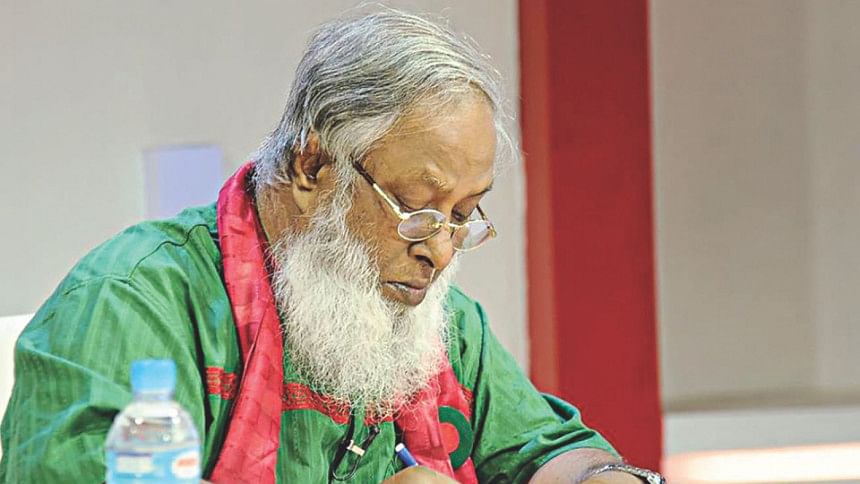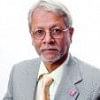A freedom fighter and Liberation War researcher

Our imagin-ation seldom can reach beyond the immediacy of time. We are free to jump on an illusory time-machine to traverse from a million year old cave to an undersea home in Mars, yet we do not venture even within that limited range; either way beyond is dark (or bright), who knows?
When I joined Qamrul for Jumma prayers at a Jessore Cantonment mosque in 1989 while coordinating for ex-cadets the Silver Jubilee Reunion of Jhenidah Cadet College (JCC) about thirty miles away, it never crossed my mind (nor perhaps his) that we were jointly being spiritual for one final time. Almost three decades later, on August 6, we were together one last time at his Janaza.
Qamrul, then already a Major, was struggling with his heaviness, an impedance to his career potential even before it began. Earlier, just after liberation, he had to shed off 15kg to join the 1st Short Service Commission at Bangladesh Military Academy, then in Comilla. Qamrul would walk to our Maghbazaar house from his in Malibagh, "Dosto, I take only muri and water, and walk the whole day", before heading to Dhaka University to add mileage. He won the battle over obesity and transformed from a freedom fighter to a 2nd Lieutenant in 1974.
In 1970-71, Qamrul and I were in Khyber, one of the three houses at JCC. We seniors were generally anti-Urdu because that language symbolised united Pakistan's domination of Bangalee. Some of us would surreptitiously tear up the Urdu Daily Jang and smear ink on the portrait of Mr M A Jinnah; getting caught was certain expulsion. Ours was the only house to do away with the Urdu Section in the House Magazine, me as Editor, citing dearth of good articles; as if we could read. College-wise we would create irritating noise by rubbing our shoes on the cemented floor as soon as lights were put off for any Urdu cinema. The spirit of independence was sown long before March 26.
Qamrul was a voracious eater, and three servings of especially polao that was served twice a week was common knowledge. Astonishingly, he would not touch chapati, also on the dinner menu twice a week; whether out of repugnance for the food or his silent war within, we never discussed. That dieting did little to change his waistline.
Akashvani (radio) Calcutta used to then broadcast a special on Bangla music in the afternoon, close to our study time. Romantic Qamrul would not miss it for the world. Often he would hurry breathlessly to the college block to be not marked late and punished. But, those few songs were his oxygen till the next afternoon.
Qamrul reached Melaghar (HQ Sector 2) near Agartala, India a month or so after us. Around sunset Mukarrimul Huq (now Engineer) rushed to announce the arrival of another JCC chap. Although thrilled,we were quizzical how he landed in the Operations camp. Explained Qamrul with all his teeth bared, "When freedom-fighters were stationed in our village, I got to handle their arms and ammunition. Also, I had Military Science in college, remember, and I told them so". Not having to go through rigorous training did not stop him from becoming a very accomplished Commander of (Comilla's) Muradnagar Thana Muktiduddho Command.
It may be difficult for today's youth to comprehend how we fought a war to liberate Bangladesh from the heinous Pakistani forces without mobile telephones; landlines too were rickety. Information had to be passed by post or in person. Capt ATM Haider, Bir Uttam, required letters to be delivered to three frontline camps overnight. Who does he choose? Qamrul, of course. No prizes for guessing who Qamrul chose. We set off on a military jeep with a SMG, which Qamrul handed over to me because of my training. Our driver manoeuvred through thick forest, up and down hills, on rugged unlit border roads. We were "arrested" at all three camps for not knowing the respective password of the night. Received cordially by the officers, the sealed letters from HQ were delivered. That was easy.
We returned to Melaghar at dawn. The camp was asleep. We were tired. Qamrul and I lay down in the yard of the Officers Mess where Haider Bhai and others camped. When we awoke, there was sunshine and buzz. Our SMG was not with us. Sheepishly we queued with others returning from similar or other missions. Haider Bhai formally noted down our feedback, and then as a matter-of-fact asked us to return the hatiyar. We were blasted and told we could all have been killed if an enemy got hold of the weapon. Qamrul remained a favourite despite that ordeal.
Tragedy struck Qamrul's family in the late 1980s when his loving and only son two-and-half-year old Sabit died of cancer. Qamrul wanted his child's grave to be framed. "I have some money left from his treatment. I don't care what people may say. Give me a design" said he. Qamrul took me to the "site" and soon construction began. Monday night, after his burial, when I passed by the child's grave his family was whimpering. Death do us apart, but painful memory lingers on. My design was intact.
There are many researchers and avid writers, but few can match the elephant's memory (sorry Dosto) that my friend held. He could incessantly narrate about child fighter Nuru, youths Ramzan and Salam, brave Iman Ali, freedom fighter boatman Abbas, and hundreds of fighters, razakars, battles and comrades.
He was most comfortable at his Baridhara DOHS-based Centre of Liberation War Studies, which he founded and chaired. As chair of Rotary District's Muktijuddho Awards Committee, having missed the ceremony, Rotarian Qamrul (Charter president of Rotary Club of Mukto Swadesh Dhaka) presented me with my crest at his book-studded den.
Qamrul lay there (also his home) in a white shroud, draped in the flag for which he fought and that of Bangladesh Army; his face beaming in heavenly bliss. Devoutly religious, Qamrul was prepared for death, more so as his health deteriorated, organ by organ, reminding us of mortality. Over the past several years, he was a regular resident of Dhaka's CMH. Visitors were always welcome. Once I went for fifteen minutes and spent two hours, reminiscing about Cadet College, the war, army and friends.
Twenty-nine titles emerged from his continuous research expanding five decades. Fluent in Chinese language, Qamrul's books in Bangla (Janojuddher Ganojoddha, Bijoyee hoye firbo noilay firboee na, Ekaturrer konya jaya jononira, Patakar proti pranadona, Shahdinata Vol. I-V and more) reflect one man's passion for 1971. Queried about his political ideology, he did say, "I do not talk about anything beyond December 16". His focus on a people and their armed struggle for emancipation earned him the Bangla Academy Literary Award 2017.
In spite of being a prolific writer, of all the books he wrote, Qamrul was particularly joyous about the one that carried the name of his then three-year old granddaughter Yusra as author. Titled "Amar nanabhai neel kalo nanabhai" (My granddad, blue-black granddad), it was an album of loving words that Yusra had uttered. Qamrul inquired of the child why she did not just say black. Yusra would retort, "No, my Nanabhai is blue-black".
On a blue-black night, Qamrul was buried with full national and military honours, including three-gun salute. As the funeral march commenced, silencing further the graveyard silence, the hearse carrying Qamrul made its way to his eternal resting place to the accompaniment of Quranic recitation. The muteness broken momentarily by burdened wailing, perhaps of his wife Rifat Nigar Shapla and daughters Chumki and Rumki.
I did not care what attending ageing freedom-fighter comrades, formally-dressed Army personnel, dignitaries, and younger men and women would think. I gave Qamrul a long salute deserving of one of the most unadulterated and dedicated freedom-fighters.
Dr Nizamuddin Ahmed is Vice Chancellor, BGMEA University of Fashion & Technology, a Commonwealth Scholar and a Fellow, a Baden-Powell Fellow Scout Leader, and a Major Donor Rotarian.





Comments